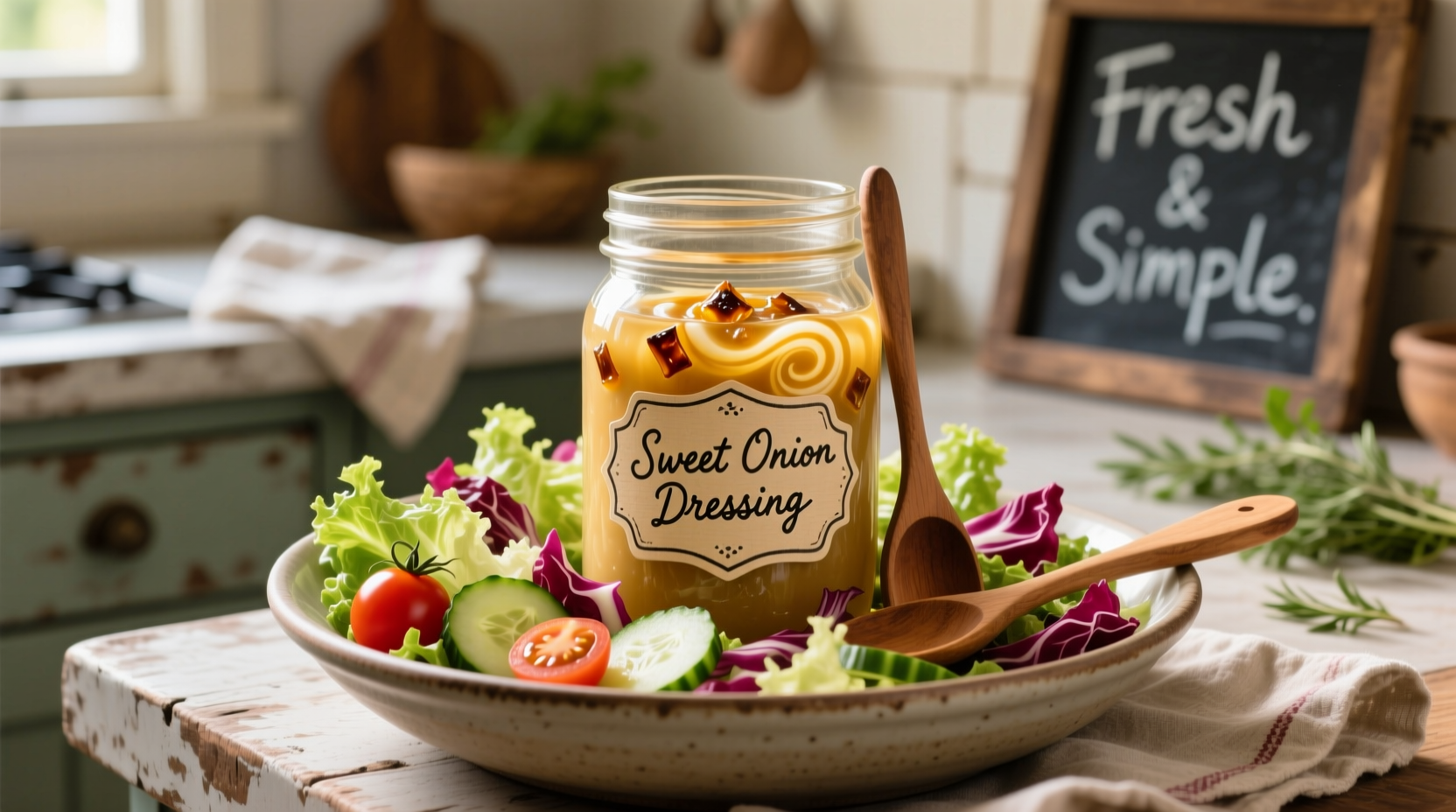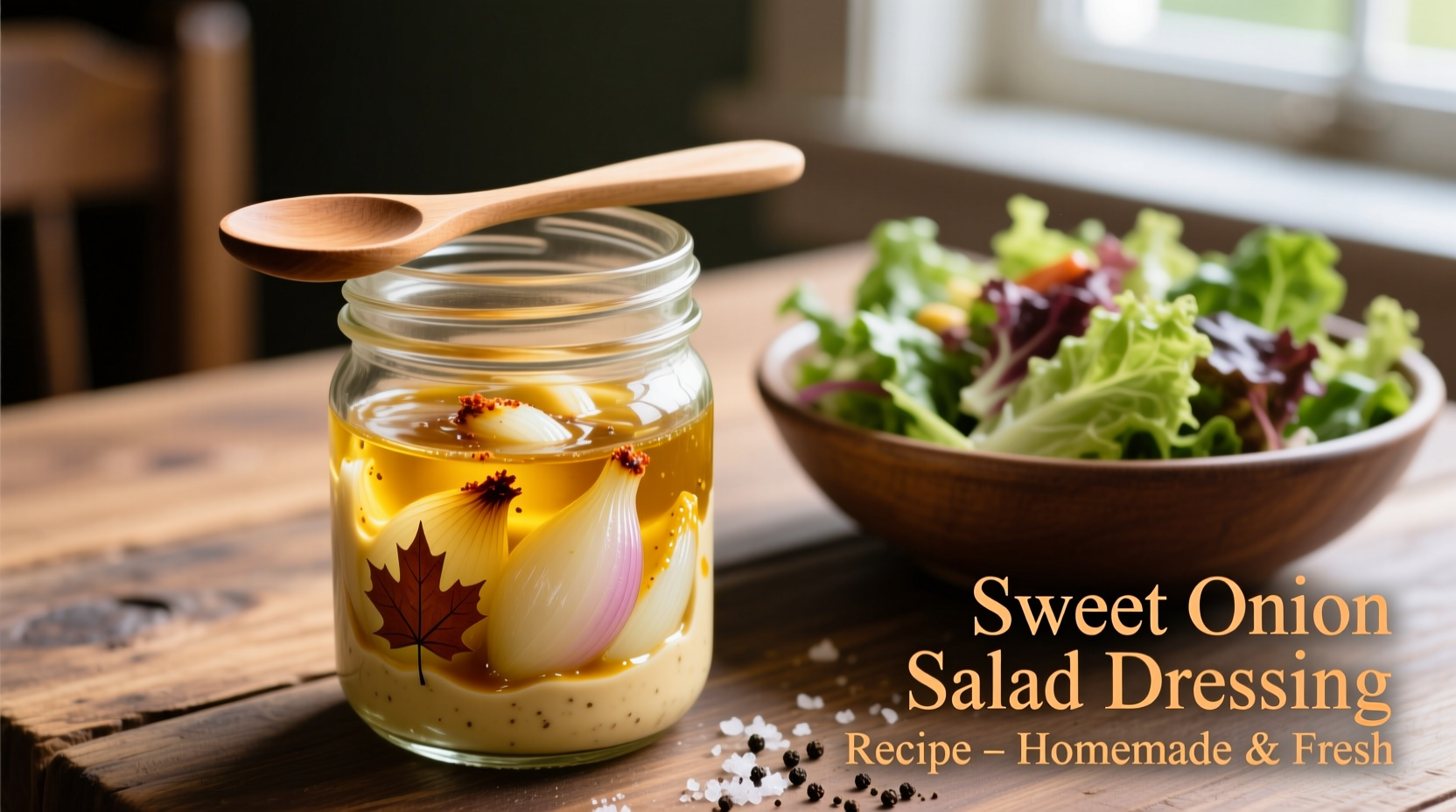Here's a quick, creamy sweet onion salad dressing recipe you can make in 10 minutes with pantry staples: combine 1 cup mayonnaise, 1/2 cup finely minced sweet onions (like Vidalia), 2 tablespoons apple cider vinegar, 1 tablespoon honey, 1 teaspoon Dijon mustard, 1/2 teaspoon garlic powder, salt and pepper to taste. Whisk until smooth and refrigerate for 1 hour before serving for best flavor development.
Looking for a sweet onion salad dressing recipe that elevates your greens from ordinary to extraordinary? This foolproof dressing delivers the perfect balance of sweet, tangy, and creamy flavors that complement any salad without overpowering fresh ingredients. Created by culinary expert Antonio Rodriguez with professional chef techniques adapted for home kitchens, this recipe solves the common problem of bland or overly acidic dressings that ruin carefully prepared salads.
Why This Sweet Onion Dressing Recipe Works
Unlike store-bought alternatives filled with preservatives and artificial flavors, this homemade sweet onion salad dressing recipe creates a vibrant emulsion that clings perfectly to greens. The magic happens through the careful balance of sweet Vidalia onions—which contain nearly twice the sugar of regular yellow onions—and the bright acidity of apple cider vinegar. Professional chefs know that proper emulsification is key, which is why this recipe includes the exact ratio of oil-based to acid components (3:1) that creates a stable dressing that won't separate in your refrigerator.
| Sweet Onion Variety | Sugar Content | Best For Dressings? | Seasonal Availability |
|---|---|---|---|
| Vidalia | 12-15% sugar | ★★★★★ | March-May |
| Walla Walla | 10-12% sugar | ★★★★☆ | June-August |
| Maui | 9-11% sugar | ★★★☆☆ | Year-round (limited) |
| Regular Yellow | 5-7% sugar | ★☆☆☆☆ | Year-round |
This comparison of sweet onion varieties shows why Vidalia onions create the most balanced sweet onion salad dressing recipe. Their higher sugar content (12-15%) provides natural sweetness without needing excessive added sugar, while their lower pyruvic acid content creates that distinctive mild flavor profile perfect for dressings. According to agricultural research from the University of Georgia (extension.uga.edu), Vidalia onions' unique sweetness develops from the low-sulfur soil in their designated growing region.
Essential Ingredients Explained
What separates a good sweet onion dressing recipe from a great one comes down to ingredient quality and understanding their roles:
- Sweet onions (1/2 cup finely minced) - Vidalia, Walla Walla, or Maui varieties work best. Finely mincing releases more flavor compounds while creating a smooth texture.
- Mayonnaise (1 cup) - Provides creaminess and helps emulsify the dressing. Full-fat works best for flavor and texture.
- Apple cider vinegar (2 tbsp) - Adds bright acidity that balances the sweetness without being harsh.
- Honey (1 tbsp) - Enhances the natural sweetness of the onions and helps stabilize the emulsion.
- Dijon mustard (1 tsp) - Contains natural emulsifiers that prevent separation and adds depth.
- Garlic powder (1/2 tsp) - Provides background flavor without raw garlic's sharpness.
- Salt and pepper to taste - Essential for balancing all flavors.

Step-by-Step Preparation
Follow these professional chef techniques for perfect sweet onion salad dressing every time:
- Prepare the onions - Finely mince sweet onions using a sharp knife (not a food processor which can make them too watery). Place in a fine-mesh strainer and press gently to remove excess liquid, which prevents a watery dressing.
- Create the base - In a medium bowl, whisk together mayonnaise, apple cider vinegar, honey, Dijon mustard, garlic powder, salt and pepper until completely smooth.
- Incorporate onions - Gradually fold in the prepared sweet onions, stirring gently to maintain texture.
- Rest the dressing - Cover and refrigerate for at least 1 hour (ideally 2-4 hours) to allow flavors to meld. This crucial step transforms a good sweet onion salad dressing recipe into an exceptional one.
- Final adjustment - Before serving, taste and adjust seasoning as needed. If too thick, add 1-2 teaspoons of water or buttermilk to reach desired consistency.
Pro Tips for Perfect Results
As a chef with experience in both Michelin-starred restaurants and home kitchens, I've identified these critical success factors for your sweet onion dressing recipe:
- Onion preparation matters - Never skip the step of draining excess liquid from minced onions. This simple technique prevents a watery dressing that won't cling to salad greens.
- Temperature is key - Use room temperature mayonnaise for easier emulsification. Cold ingredients don't blend as smoothly.
- Resting time transforms flavor - The 1-4 hour resting period allows the sulfur compounds in onions to mellow while the sweet flavors develop fully.
- Storage affects texture - Homemade dressings naturally separate over time. Simply shake or whisk before use—this is normal and indicates no artificial stabilizers.
When This Dressing Shines (and When to Choose Something Else)
Understanding context boundaries helps you use this sweet onion salad dressing recipe effectively:
- Perfect for - Mixed greens, spinach salads, wedge salads, grain bowls, and as a dip for fresh vegetables
- Ideal pairings - Salads with strawberries, pecans, blue cheese, grilled chicken, or roasted vegetables
- Avoid using with - Delicate greens like arugula (the sweetness overpowers), or in dishes requiring sharp acidity like Greek salads
- Not suitable for - Vegan diets (contains dairy-based mayonnaise) or low-fat diets (requires full-fat base for proper emulsion)
Customization Options
Make this sweet onion dressing recipe your own with these chef-approved variations:
- Herb-infused version - Add 2 tablespoons fresh dill or chives for a garden-fresh twist
- Spicy kick - Mix in 1/4 teaspoon cayenne pepper or a few dashes of hot sauce
- Vegan alternative - Substitute vegan mayonnaise and maple syrup for honey
- Lighter option - Replace half the mayonnaise with Greek yogurt (note: reduces shelf life to 3 days)
- Restaurant-style - Add 1 teaspoon poppy seeds for that classic sweet onion poppy seed dressing experience
Serving and Storage Guidelines
For best results with your sweet onion salad dressing recipe:
- Serving temperature - Always serve chilled but remove from refrigerator 15 minutes before use for optimal flavor release
- Application technique - Toss salad greens with dressing using clean hands for most even coating
- Shelf life - Properly stored in an airtight container, this dressing keeps for 7-10 days in the refrigerator
- Separation is normal - Homemade dressings lack artificial stabilizers, so simply shake or whisk before each use
- Do not freeze - Freezing alters the emulsion and texture permanently
Frequently Asked Questions
Can I use dried onions instead of fresh sweet onions?
No, dried onions won't provide the same fresh flavor and texture. The natural moisture and enzymes in fresh sweet onions are essential for the dressing's characteristic flavor profile. If fresh sweet onions aren't available, regular yellow onions with 1 extra tablespoon of honey can work in a pinch, but the result won't be as balanced.
Why does my dressing separate in the refrigerator?
Separation is normal in homemade dressings without artificial stabilizers. Simply shake vigorously or whisk for 10-15 seconds before use. To minimize separation, ensure you're using room temperature ingredients when preparing and include the full amount of Dijon mustard, which contains natural emulsifiers.
How can I make this dressing last longer?
For maximum shelf life (7-10 days), store in an airtight container in the coldest part of your refrigerator. Always use clean utensils when serving to prevent bacterial contamination. The acidity from the vinegar helps preserve the dressing, but homemade versions naturally have a shorter shelf life than commercial products with preservatives.
Can I double this sweet onion salad dressing recipe?
Yes, this recipe scales perfectly. When doubling, maintain the same ingredient ratios but consider increasing the resting time to 3-4 hours to allow flavors to meld properly. Use a larger bowl for mixing to ensure even incorporation of ingredients.
What's the difference between this and sweet onion poppy seed dressing?
The primary difference is the addition of poppy seeds (typically 1-2 teaspoons) in poppy seed variations. Traditional sweet onion dressing focuses on the onion flavor, while poppy seed versions add both visual interest and a subtle nutty flavor. Both share the same sweet-tangy-creamy profile but serve slightly different culinary purposes.











 浙公网安备
33010002000092号
浙公网安备
33010002000092号 浙B2-20120091-4
浙B2-20120091-4